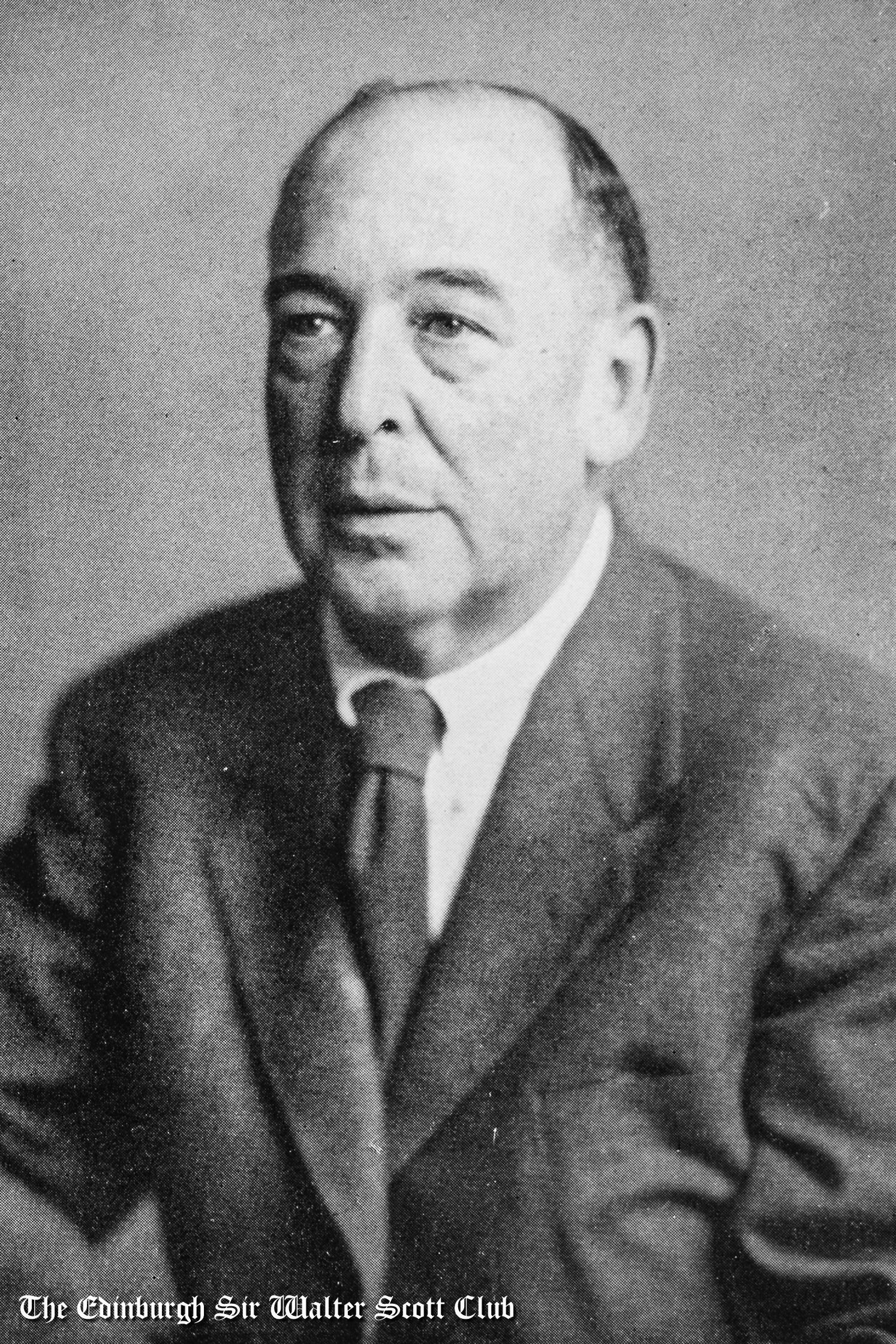1955
Our President in 1955/56 was:
Professor C. S. Lewis
He proposed the Toast to Sir Walter at our 48th Annual Dinner on Friday 2nd March 1956 in The North British Hotel
Download the [transcript] or read the [bulletin]
Summary of the Speech:
In this characteristically rich and intellectually layered tribute, Professor C. S. Lewis celebrated Sir Walter Scott not only as a novelist but as a deeply humane and honourable man, whose literary genius was inseparable from his personal integrity and character.
Key Themes and Points:
1. Scott’s Humanity and Perspective:
- Lewis begins with a poignant anecdote from Scott’s Journal (“Gurnal”) about a sleepless night disrupted by a howling dog. Despite his grief (his wife had just died) and financial distress, Scott expresses sympathy for the dog. This moment encapsulates Scott’s characteristic empathy and philosophical calm—a refusal to centre his own suffering.
2. Sense and Sensibility in the Gurnal:
- Lewis praises the Gurnal for its balance of “sense” and emotional honesty. Scott is candid about fleeting jealousies, fears, and petty feelings, but also exercises deep self-awareness and restraint. Lewis highlights Scott’s refusal to erase or edit entries, even when they revealed his pride or pain.
3. Mental Distress and Sincerity:
- Scott was not free from mental anguish—he experienced episodes of depression, dread, and feelings of unreality—but, unlike many modern writers, he never allowed these to seep into his public persona or novels. Lewis contrasts Scott’s stoicism and sincerity with the performative “sincerity” of later literary figures.
4. Artistic Purpose vs. Modern Expectations:
- Lewis defends Scott against modern critics who deride his “cheerful” tone as lacking psychological depth. He argues that Scott didn’t view novels as “comments on life” but as art forms—like comedies or romances—crafted for delight, not therapy or social critique.
5. Integrity over Literary Perfection:
- Lewis admits Scott sometimes wrote hastily, especially when working to repay debts, but suggests this was not artistic negligence but moral integrity. For Scott, honour and financial responsibility took precedence over literary ambition.
6. Style and Scottish Polysyllabism:
- Scott’s narrative prose is often overblown and florid, but Lewis attributes this partly to both Scottish rhetorical tradition and the prevailing taste of the 19th century. However, Scott’s dialogue—especially in dialect—is lively, witty, and full of character, as seen in figures like Baillie Nicol Jarvie and Wandering Willie.
7. Scott as a Pioneer of the Historical Imagination:
- Lewis credits Scott with giving readers a true sense of historical period—something absent from Shakespeare’s or Chaucer’s historical characters. Scott helped establish the notion that past societies were genuinely different, not just costume-clad versions of the present.
8. Moral Proportion and Balance:
- Unlike Dickens or George Moore, Scott never indulged in emotional excess. He maintained moral and narrative balance—refusing to inflate minor flaws into grand tragedies.
9. Final Reflections:
- Lewis notes Scott’s declining popularity, lamenting that younger generations find him inaccessible or misinterpret his characters through a Freudian lens. He closes with humour and grace, echoing Scott’s own compassion: “Poor curs. I daresay they have their distresses.”
Interesting Observations:
- Scott’s reluctance to dramatize his anguish sets him apart from many Romantic and modern writers; Lewis sees this as a strength, not a failing.
- Scott’s style is both mocked and redeemed: Lewis shows where it falters (e.g., “the melancholy intelligence”) and where it suddenly reveals unexpected truth (“I find my dogs’ feet on my knees”).
- Scott’s storytelling is likened to play—his exuberance and ease make him akin to Cervantes or Chaucer rather than Tolstoy or Dante.
- Lewis notes that if art becomes too self-aware, it may lose its spontaneity and joy.
This speech by C. S. Lewis stands as one of the most perceptive defences of Walter Scott’s legacy in the mid-20th century—blending literary criticism, biographical insight, and philosophical reflection. It's a deeply affectionate yet critically rigorous appraisal that remains valuable for readers today.
Download the [transcript] or read the [bulletin]

Subsidiary Toasts
The toasts of “The Queen” and “The Royal Family” were duly honoured.
Thereafter Brig. A. D. Buchanan Smith, C.B.E., T.D., D.S.C., D.L., proposed the toast of “The Imperial Forces,” to which Lieut.-General Sir Horatius Murray, K.B.E., C.B., D.S.O., replied.
“The City of Edinburgh” was proposed by Sir J. Randall Philip, Q.C.; and replied to by The Rt. Hon. Sir John G. Banks, C.B.E., LL.D., The Lord Provost of Edinburgh.
The toast of The Chairman was proposed by Mr Allan C. Frazer, W.S.


